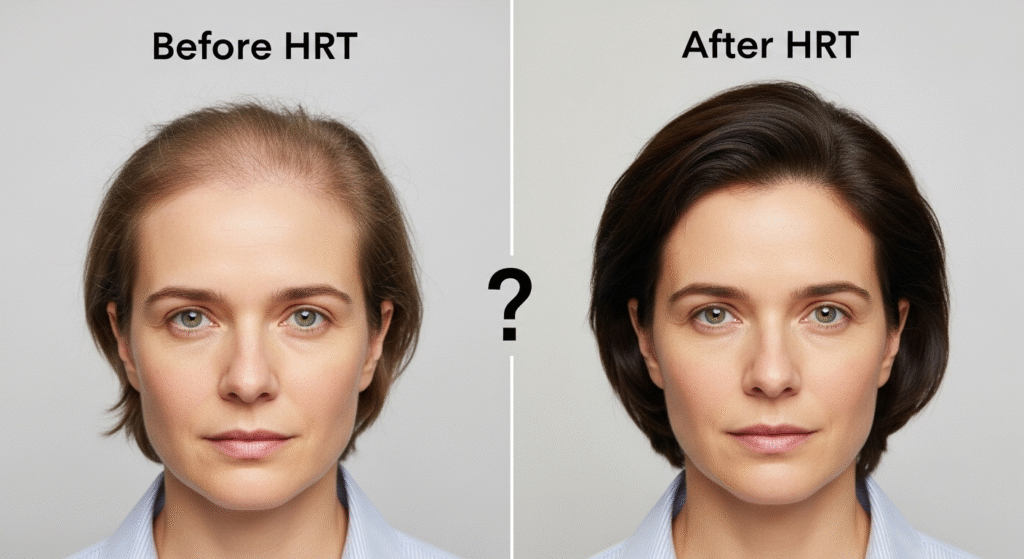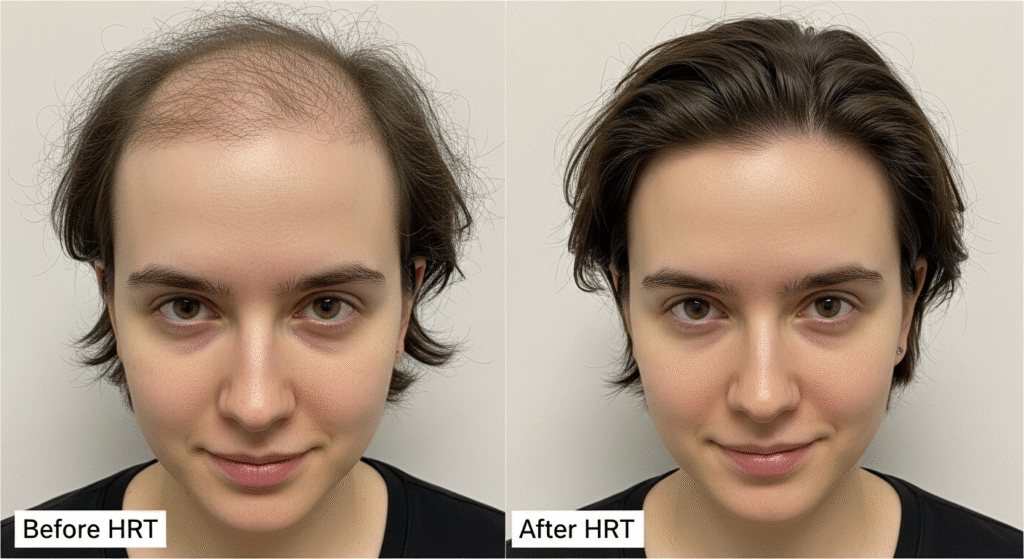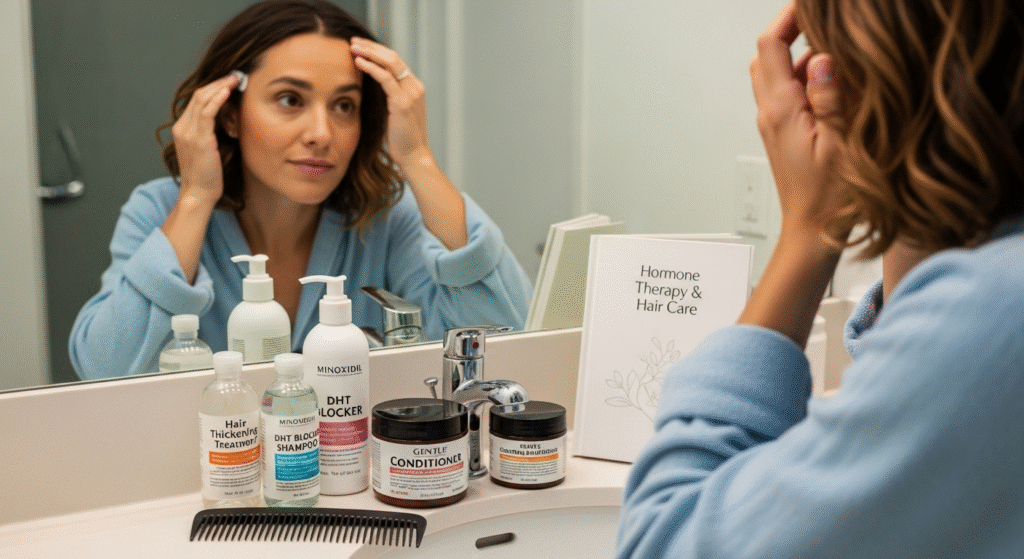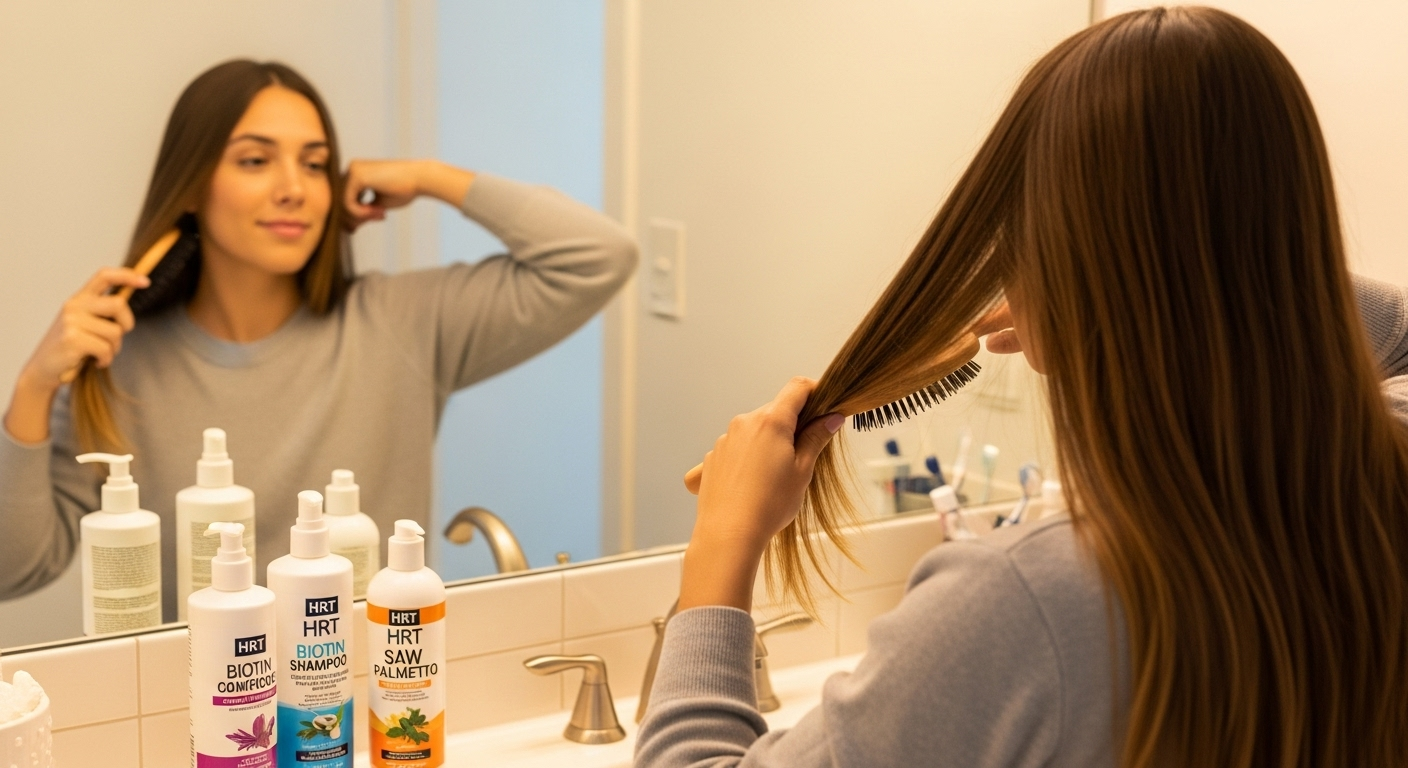Hair loss can be a distressing issue, particularly during significant hormonal shifts such as menopause or gender-affirming transition. You may be wondering, “Will HRT Help with Hair Loss? " Hormone Replacement Therapy (HRT) can play a crucial role in hair health, potentially reducing hair thinning and promoting growth. In this article, we’ll explore how HRT …
Hair loss can be a distressing issue, particularly during significant hormonal shifts such as menopause or gender-affirming transition. You may be wondering, “Will HRT Help with Hair Loss? “ Hormone Replacement Therapy (HRT) can play a crucial role in hair health, potentially reducing hair thinning and promoting growth. In this article, we’ll explore how HRT impacts hair, the benefits and risks, and how to manage your hair health during treatment.

How Will HRT Help with Hair Loss and Influences Hair Growth
Estrogen and Hair Health
Estrogen, one of the primary hormones affected by HRT, plays an essential role in hair growth. It supports the anagen (growth) phase of the hair cycle, helping hair grow more effectively and preventing hair loss. During menopause, estrogen levels naturally decline, which often leads to hair thinning. By restoring estrogen levels, HRT can help reverse or slow down the thinning process.
- Prolongs the Growth Phase: Estrogen extends the growth phase of hair, promoting longer and denser hair.
- Hair Density Improvement: Restoring estrogen levels can lead to a noticeable improvement in hair volume.
Progesterone’s Role
Progesterone works alongside estrogen to balance its effects on hair. While its direct impact on hair growth isn’t as significant as estrogen’s, progesterone helps maintain overall hair health, contributing to a more balanced hormonal environment for hair follicles.
- Balanced Hormones for Healthy Hair: Progesterone helps counteract the negative effects of estrogen imbalances on hair growth.
- Supports Hair Follicle Health: Maintaining progesterone levels may help in maintaining healthy hair follicles.
Testosterone’s Impact
Testosterone, another hormone involved in HRT, can have a complex effect on hair. It can convert to dihydrotestosterone (DHT), which is linked to hair follicle shrinkage, leading to hair thinning, particularly in the scalp area. For those undergoing feminizing HRT, the goal is to reduce the effects of testosterone and DHT to avoid hair loss.
- DHT and Hair Thinning: High levels of testosterone can lead to an increase in DHT, contributing to hair loss.
- Managing Testosterone’s Effects: Anti-androgens used in feminizing HRT can help reduce the effects of DHT and encourage hair regrowth.
HRT’s Effectiveness in Treating Hair Loss

Menopausal Hair Loss
For individuals experiencing menopause, hair loss often occurs due to hormonal imbalances, particularly the decrease in estrogen and progesterone. HRT can help restore these hormones, reducing hair thinning and promoting healthier hair growth. While results vary, many individuals report improved hair density and texture after beginning HRT.
- Hair Restoration: Many women experience thicker, fuller hair after several months of HRT.
- Slows Thinning: HRT helps slow down the progression of menopause-related hair thinning.
Transgender Women and Hair Growth
For transgender women undergoing feminizing HRT, estrogen therapy combined with anti-androgens can support the growth of scalp hair while reducing facial and body hair. In some cases, individuals notice a significant improvement in hair texture, density, and overall health.
- Feminizing Effects: Estrogen therapy can help reduce male-pattern baldness and promote scalp hair growth.
- DHT Reduction: Anti-androgens reduce testosterone’s ability to produce DHT, allowing for hair regrowth.
Individual Variability
The response to HRT varies significantly between individuals. While some may see positive changes, others might experience little to no improvement in hair growth. Factors such as genetics, the type of HRT used, and overall health will play a role in the results.
- Varied Responses: Some may see visible improvements, while others may not.
- Genetic Influence: Genetics play a significant role in how effective HRT will be for each individual.
Risks and Considerations
Potential Side Effects
While HRT offers many benefits, it is not without risks. Some individuals may experience side effects such as scalp irritation or changes in hair texture. These side effects may diminish over time as the body adjusts to the hormone therapy.
- Scalp Sensitivity: Some may experience scalp dryness or irritation.
- Changes in Hair Texture: HRT can alter the texture of hair, making it feel either coarser or finer.
Adjusting HRT Regimens
For individuals experiencing negative side effects, adjusting the dosage or type of hormone used can alleviate issues. Consulting with a healthcare provider is essential to ensure the correct balance is achieved for optimal hair health.
- Dosage Adjustments: Tailoring the HRT regimen can help mitigate side effects.
- Continuous Monitoring: Regular check-ups with a doctor ensure that the right hormonal balance is maintained.
Consulting Healthcare Providers
It’s important to consult with healthcare professionals regularly during HRT treatment. They can provide advice on the best treatments for hair loss, adjust hormone doses, and recommend additional products or treatments to promote hair growth.
- Expert Guidance: Regular consultations help manage side effects and optimize treatment.
- Personalized Treatment: Healthcare providers can tailor HRT based on your specific needs.
Managing Hair Health During HRT

Nutritional Support
A well-balanced diet rich in vitamins and minerals can support hair growth during HRT. Nutrients such as biotin, zinc, and omega-3 fatty acids play vital roles in maintaining healthy hair follicles.
- Hair-Healthy Foods: Include foods rich in vitamins and minerals that support hair health, such as leafy greens, eggs, and fish.
- Supplements: Consider taking supplements that support hair growth, as advised by your doctor.
Gentle Hair Care Practices
Using gentle hair care practices can prevent damage and support healthy hair growth. Opt for sulfate-free shampoos, avoid excessive heat styling, and minimize chemical treatments to keep your hair in its best condition.
- Avoid Harsh Chemicals: Sulfate-free products are less likely to strip hair of its natural oils.
- Minimize Heat: Heat styling tools can weaken hair, so limit their use.
Stress Management
Stress is another factor that can exacerbate hair loss. Implementing stress reduction techniques such as mindfulness, yoga, or regular exercise can help support overall hair health during HRT.
- Relaxation Techniques: Mindfulness and meditation can help reduce stress-related hair thinning.
- Exercise: Regular physical activity improves overall circulation, promoting healthy hair growth.
Medical Treatments
In addition to HRT, treatments like minoxidil can be recommended to promote hair growth. Minoxidil is a topical solution that has been shown to improve hair density in individuals with hair thinning or hair loss.
- Minoxidil Application: Consult with your doctor to determine if minoxidil is right for you.
- Complementary Treatments: Combining HRT with other hair growth treatments may yield better results.
FAQs
Can HRT reverse hair loss?
HRT can help restore hormonal balance, which may reverse or slow down hair thinning. However, results vary, and not everyone will experience significant hair regrowth.
Is HRT the only solution for hair loss?
No, other treatments like minoxidil or finasteride may be considered in conjunction with HRT to help manage hair loss.
How long does it take to see results from HRT on hair?
Hair growth improvements typically take several months to become noticeable. Patience is key when undergoing HRT for hair health.
Conclusion
Hormone Replacement Therapy can be an effective solution for addressing hair loss related to hormonal imbalances, such as menopause or gender transition.
However, its effects can vary from person to person, and results may take several months.
It’s essential to consult with Dr. Uzma Irfan, an ISHRS-certified surgeon, to ensure that HRT is the right choice and to manage any side effects. With proper care, lifestyle changes, and expert guidance, you can improve hair health during HRT






